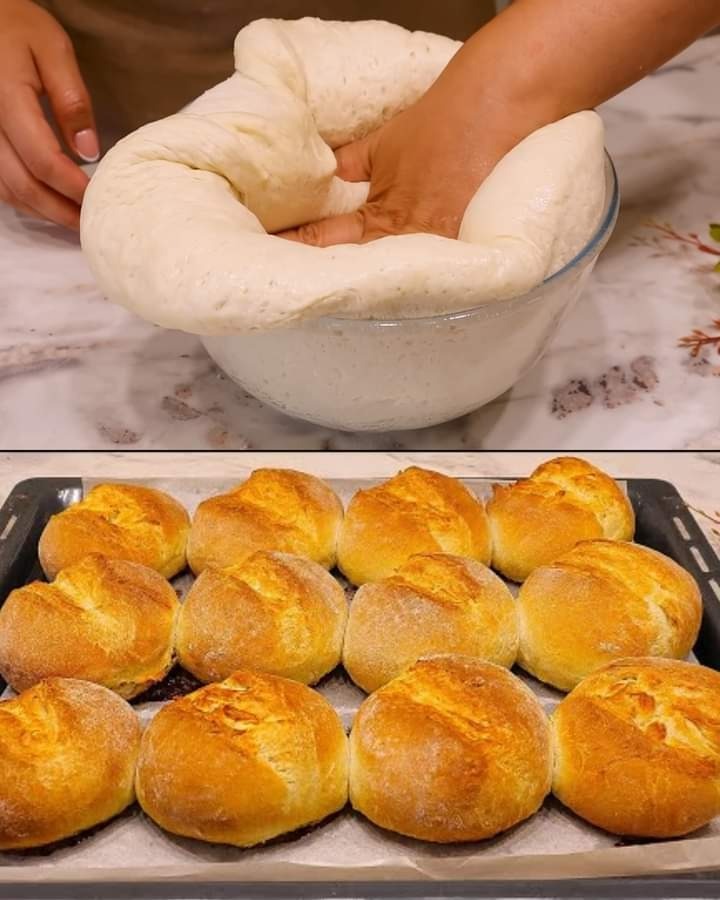ADVERTISEMENT

Fluffy Homemade Buns
Activate the Yeast:
In a large bowl, mix together warm water, warm milk, sugar, salt, and yeast. Stir well and let it sit for 5-10 minutes until the yeast becomes frothy.
Add Butter:
Stir in the softened butter until fully incorporated into the liquid mixture.
Add Flour:
Gradually add sifted flour to the wet ingredients, mixing continuously until a soft dough forms. Start with 750 grams of flour and add more as needed to get a smooth dough that isn’t too sticky.
Knead the Dough:
Transfer the dough to a lightly floured work surface. Knead for 2-3 minutes until smooth and elastic. Form the dough into a ball.
First Rise:
Lightly grease a bowl with sunflower oil and place the dough inside. Cover with a clean kitchen towel or plastic wrap and let it rise in a warm place for 1 hour, or until the dough has doubled in size.
Divide the Dough:
Once the dough has risen, punch it down gently to release the air. Divide the dough into 12 equal portions. Roll each portion into a smooth ball.
Rest the Dough Balls:
Place the dough balls on a lightly floured surface. Cover them with a kitchen towel and let them rest for 15 minutes.
Shape the Buns:
After resting, flatten each ball slightly with a rolling pin and shape them into buns. Place them on a baking sheet lined with parchment paper.
Second Rise:
Cover the buns and let them rise in a warm place for 40-50 minutes, or until they’ve puffed up nicely.
Preheat the Oven:
While the buns are rising, preheat your oven to 190°C (370°F).
Add Butter for Flavor:
Melt 50 grams of butter. Gently brush the tops of the buns with melted butter before baking.
Bake the Buns:
Bake the buns in the preheated oven for 25-30 minutes, or until golden brown on top. Rotate the tray halfway through for even browning.
Cool and Serve:
Remove from the oven and let the buns cool slightly on a wire rack. Serve warm, or cool completely for storage.
Serving Suggestions:
These buns are perfect for burgers, sandwiches, or alongside soups and stews.
Slice them in half and toast for a delicious breakfast with jam or butter.
Use them as the base for sliders or mini sandwiches at parties.
Cooking Tips:
Make sure your water and milk are warm (around 100-110°F) to activate the yeast, but not too hot, as this can kill the yeast.
Sift the flour for a lighter, softer texture in the buns.
If your dough feels sticky while kneading, sprinkle a little extra flour on the surface, but avoid adding too much as it can make the buns dense.
Nutritional Benefits:
These buns provide a good source of carbohydrates for energy.
Adding butter enhances the flavor and adds some healthy fats, contributing to the buns’ richness.
Using milk also adds calcium to the recipe.
Dietary Information:
Vegetarian-Friendly: These buns contain dairy but no meat or animal by-products (except for butter).
Easily Adaptable: You can substitute the butter with margarine for a dairy-free version, and use plant-based milk if desired.
Nutritional Facts (per bun, approximate):
Calories: 230
Protein: 5g
Carbohydrates: 40g
Fat: 6g
Fiber: 1.5g
Sodium: 300mg
Storage Information:
Room Temperature: Store the buns in an airtight container for up to 3 days.
Freezing: These buns freeze well! Wrap them in plastic wrap or place in a freezer-safe bag and store for up to 2 months. To reheat, thaw at room temperature and warm in the oven for a few minutes.
Why You’ll Love This Recipe:
These buns are light, fluffy, and incredibly versatile, perfect for any meal.
The soft texture makes them ideal for sandwiches, burgers, or dinner rolls.
They’re easy to prepare and can be made ahead of time for freezing or meal prep.
The homemade flavor is unmatched, and they smell divine while baking!
Conclusion
These fluffy homemade buns are a staple in any kitchen. With a soft and tender crumb, they are sure to become a favorite for your family. Whether you’re making burgers, serving them with soup, or enjoying one with butter and jam, these buns hit the spot every time. The simple ingredients and easy-to-follow process make baking bread at home enjoyable and rewarding!
10 Frequently Asked Questions:
Can I use whole wheat flour instead of white flour?
Yes, you can substitute part or all of the white flour with whole wheat flour for a more nutritious bun. Keep in mind that they may be denser.
Can I make these buns dairy-free?
Absolutely! Substitute the butter with dairy-free margarine and use a plant-based milk like almond or soy milk.
How can I make sure the buns rise well?
Ensure your yeast is fresh and your liquids are warm but not too hot. A warm, draft-free environment is best for rising.
Can I freeze the dough?
Yes! You can freeze the dough after shaping it into balls. Let it thaw and rise before baking.
Can I add seeds or herbs to the dough?
Yes, you can mix in sesame seeds, poppy seeds, or herbs like rosemary to the dough before shaping.
Can I make the buns larger or smaller?
Absolutely! For larger buns, divide the dough into fewer portions, and for smaller buns, divide into more.
Do I have to use sunflower oil?
No, you can use any neutral oil like vegetable oil or olive oil to grease the bowl.
How can I store leftover buns?
Store them in an airtight container at room temperature for up to 3 days or freeze for longer storage.
What can I serve with these buns?
They are perfect for burgers, sandwiches, or alongside soups, stews, and salads.
Can I make these buns without yeast?
Yeast is necessary for these fluffy buns, but you can try a no-yeast recipe for quick rolls if needed!